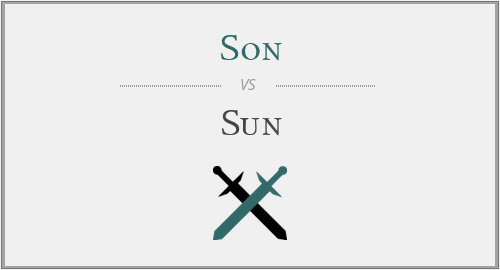Son vs. Sun
Besides their similar spellings and the fact that they both function as a noun within most phrases, the words ``son” and “sun” actually have nothing else in common. They are not synonyms, or words from the same semantic field.
As for the differences between them, besides being used in different contexts, they are also different syntactically. While “son” has the unique function of a noun, and a unique meaning, “Sun” is more versatile and may be used both as noun and as verb, with different significations. Below you have all these meanings explained and illustrated within relevant examples.
When do we use “son”?
One of the most common and simple English words, “son” is simply a noun that defines a male child. In other words, if someone’s child is of the male gender, they are called a “son”.
Example: She gave birth to a little baby boy, and her husband felt so proud to have a son. – “son” is a male child.
When do we use “Sun”?
Written like this, with a capital letter, “Sun.” is the written abbreviation for “Sunday”. However, in day to day conversations, you won’t hear it like this. It’s pronounced Sunday, and may be written “Sun” only as an abbreviated form.
Moving on to the primary definition, “sun” is usually used as a noun, defining the bright and large star that shines in the sky and provides heat and light energy for the Earth during daylight hours. As a secondary meaning, the noun may also refer to the heat and light that comes from this large star during the day.

Last but not least, “sun” may also appear sometimes as a verb, describing someone’s action when they sit or lie in the light and heat of this star during the day.
Example 1: I’ll meet you on Sun. – “Sun” may be used as a written abbreviation for the word “Sunday”.
Example 2: The sun was shining so brightly on that day, you couldn’t step outdoors without sunglasses. – “sun” mainly defines the bright, large star that shines in the sky during daytime, providing light and heat for the Earth.
Example 3: Don’t stay in the sun for too long; I don’t want you to get sunburnt. – “sun” may also refer to the light and heat provided by the large star during daytime.
Example 4: Go to the beach if you want to sun yourself. – as a verb, “sun” refers to the action someone does when they sit or lay in the light and heat of the large star during daytime.
Conclusion
The word “sun” has multiple meanings and uses in English, none of which is similar or connected to the meaning of the word “son”. The former is related to the bright, large star in the sky that provides heat and light for the Earth, whereas the latter is simply the name of a male child.
Keeping these short explanations in mind will most likely be enough for you to keep things clear and never misspell or misuse “son” and “sun” again.




Have a discussion about this article with the community:
Report Comment
We're doing our best to make sure our content is useful, accurate and safe.
If by any chance you spot an inappropriate comment while navigating through our website please use this form to let us know, and we'll take care of it shortly.
Attachment
You need to be logged in to favorite.
Log In